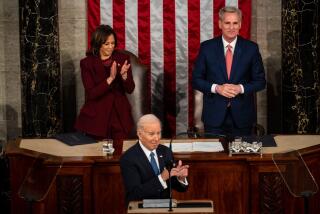Bush Deficit Cure Called Unrealistic : Talks With Congress on Tax Hikes, Spending Cuts Key, GAO Report Says
- Share via
WASHINGTON — In a direct rebuke to President-elect George Bush’s campaign proposal to eliminate the federal budget deficit through a “flexible freeze” on federal spending, the General Accounting Office warned bluntly Saturday that it would be impossible to “freeze our way out of the (deficit) problem.”
“There are no quick or painless solutions to the federal government’s budget problem,” the congressional watchdog agency said in an official report, the first of 23 on issues facing the next President and Congress.
The only realistic alternative, the GAO recommends, is for the new Administration and congressional leaders to open negotiations early in 1989 on a multi-year deficit-reduction package of spending cuts and tax increases.
“All participants,” the report says, “must consider all parts of the budget to be negotiable, including defense, entitlements (such as Social Security, government pensions and Medicare) and revenues.”
Other Means Held Unreliable
Not only is the “flexible freeze” unrealistic, the GAO report said, but the nation also cannot rely on rapid economic growth, Gramm-Rudman automatic spending cuts or the proposal of defeated Democratic candidate Michael S. Dukakis to “gather in some magic pool of uncollected revenues” to bring the deficit under control.
“When you are looking at this size of a deficit,” Comptroller General Charles A. Bowsher said in an interview, “we just don’t think it is realistic to believe that a freeze will work or that we can somehow grow out of the problem without really changing policies.”
Bush has promised to participate in negotiations with Congress shortly after taking office, but he has vowed to oppose any explicit tax increases or changes in Social Security benefits. Asked for a reaction, Bush officials immediately rejected the GAO conclusions.
“The GAO has been wrong in the past,” said David Prosperi, a spokesman for Bush’s transition team. “The President-elect has emphasized time and again that raising taxes is not the way to solve the problem. The program of a flexible freeze will work. Once he takes office, he will take action to start reducing the deficit.”
The GAO, which normally conducts studies only in response to requests from lawmakers, took the unprecedented step of preparing its own reports for the presidential transition, Bowsher said, because its officials felt that policy-makers needed a clear statement of a wide range of future government problems. Contrasted with most GAO studies, which tend to be abstruse, these initial reports are short and well-written.
The GAO contends that reducing the deficit to tame proportions is far more difficult than might be suggested by the official projections that last year’s budget gap of $155 billion will shrink naturally to about $120 billion in five years as long as there are no changes in current policies.
“There is an explosion of unfunded costs waiting to greet the new Administration,” the report states. “Some of these are unavoidable.”
Lists Pressing Problems
The GAO, which serves as an investigative arm of Congress and also alerts lawmakers to complex government issues, cited a number of pressing problems requiring higher spending in the future that were not taken into account by those who developed Bush’s budget proposal. These include:
--At least $50 billion in additional money over several years to bail out ailing savings and loans whose deposits are guaranteed by the government-sponsored Federal Savings & Loan Insurance Corp. “There are about 500 insolvent thrifts which are losing money at the rate of almost $17 billion per year,” the report says.
--The cost of fixing environmental and technical problems at the nation’s aging and hazardous nuclear weapons plants. “Based on preliminary data,” the GAO says, “we estimate the cost, over a number of years, of cleanup and modernization at $100 billion to $130 billion.”
--The absence of enough money in current budget projections to pay for the military programs that the Pentagon is planning. The Defense Department’s most recent five-year plan, the report states, “will cost at least $200 billion more than is likely to be available even assuming that the defense budget grows 2% faster than inflation.”
--The price of technological advances. New computer systems for a number of federal agencies are expected to cost as much as $100 billion over the next decade. At the same time, the National Aeronautics and Space Administration is preparing to build a space station that will cost at least $28 billion and require an estimated $1.4 billion a year to operate.
In addition to these already known spending pressures, the GAO cites several national issues for which “there is growing public pressure that the federal government provide a solution.”
These include the growing demand to help the elderly finance the cost of nursing homes and other long-term care; a call for new federal prisons, which Bush endorsed on the campaign trail; the need for repairs to deteriorating public housing for the poor, and the urgency of improving the nation’s aging bridges and roads.
Crucial to Policy Agenda
Unless the budget predicament is resolved, the GAO report states, it will be all but impossible for the new Administration to “pursue its own policy agenda, for the economy to retain its vigor and for the American people to enjoy a long-term standard of living comparable to the rest of the developed world.”
In an unusual departure, the GAO report recommends that budget negotiations should include Alan Greenspan, chairman of the Federal Reserve, as a participant, or “at least as an observer--because of the importance for the economy of carefully adjusting monetary policy as progress is made on the deficit.”
Bowsher, in the interview, acknowledged that there are legal hurdles that would prevent Congress from adopting a firm multi-year deficit package because of the constitutional prohibition against current lawmakers tying the hands of any future Congress. “But if you get an agreement of the leadership of Congress and the Administration,” he said, “there is a pretty good chance that the next Congress would follow it.”
More to Read
Sign up for Essential California
The most important California stories and recommendations in your inbox every morning.
You may occasionally receive promotional content from the Los Angeles Times.










